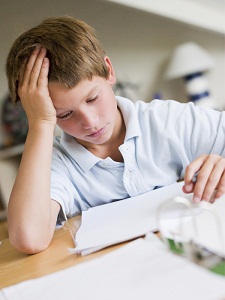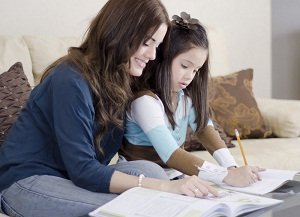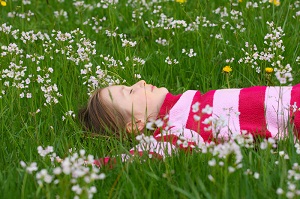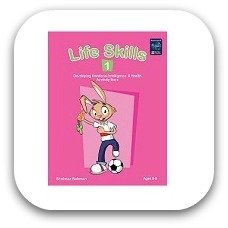Child Stress Management
By Shahnaz Bahman
Practical Ways To Help Your Kids Cope With Childhood Stress

Stressed Out?
You’re not the only one! Many of us experience stress, but it is not just adults that fall prey to the degenerating condition — children also suffer. Learn about child stress management techniques here.
Like parent, like child
As parents we can be so preoccupied with wanting to do the best for our children that we might not find the occasion to pause and reflect, on our own and our children's feelings. However, at times, a breather can pay off greatly, as author Douglas Pages explains in Winnie The Pooh. “Sometimes it's important to work for that pot of gold. But in other instances it's essential to take time off, to make sure that your most important decision of the day simply consists of choosing which colour to slide down on the rainbow.” Being on life's treadmill with no rest can cause us a lot of stress. Children also go through this in their own world.
Causes of Childhood Stress
A child ‘s life is full of challenges and adventures. They can get caught up in achieving their own targets; getting things done, meeting their personal needs and the expectations of the adults around them. When things don't go quite to plan, when they can't meet expectations or when they don't have smooth loving relationships with those around them, they can become overwhelmed with life and feel stressed. Another cause of this is having the feeling of too much to do, while not having the right motivation, interest or the ability to do what is required of them. This can consist of school homework, grades, home duties or sitting for tests and exams.
The good, the bad and the ugly
Occasional or moderate stress is important; if we are too relaxed and have no sense of urgency our level of achievement may be lower. However, exposure to high levels of stress over time can be damaging, causing havoc to our brains. Research shows that excessive exposure to toxic stress can disrupt
the development of brain circuits related to stress response, learning and memory.
A Helping Hand With Child Stress Management

The most
important step is to aid your child in developing self-awareness.
Children need to learn how to recognise the difference between their
emotions and more specifically when they are stressed. This can be
achieved by modelling correct behaviour to children; talking about how
we feel when we are in a stressful situation. Explain when you feel
stressed out; talk about feeling like you have butterflies in your
stomach, are experiencing pain in certain parts of your body or have an
anxious feeling about a specific thing. It's important to mention that
it's normal to have these symptoms and feelings and there are things we
can do to help ourselves.
Recognition and acceptance of
negative emotions is an important step in developing child stress
management skills. Stories or play time can also be used to develop this
kind of awareness. Another interesting way to teach children is to draw
a funny child-friendly thermometer scaled from one to ten and call it
‘My feeling thermometer.’ Place it somewhere that is easily accessible
to your child. Make a sad or angry face, out of card and ask them to
place it on the thermometer when they feel stress. It can be placed on
the scale of one to ten. This way your child will learn to be able to
recognise their own stress levels.
Taking time to relax can be
an important part of your child's routine, especially before doing
homework or studying. Research shows that learning cannot take place
when the brain is preoccupied. It is important to allow children to
clear their minds and become more in tune with their feelings and
emotions before inviting them to do things that are emotionally or
cognitively demanding.
A Practical Approach To Child Stress Management

Dumping bin
Invite
your child to write their negative feelings on strips of paper and then
throw them away. After the exercise, if your child is comfortable to
talk about what they wrote you can simply listen to them without being
judgmental or turning it into a lecturing session. This is an effective
child stress management technique.
Relaxation
Relaxation
exercises help children to cool down, clear their minds, and improve
concentration. They are perfect for exam periods or when children are
going through difficult times. Ask your child to close their eyes and
sit comfortably. Explain that you are going to ask them to imagine that
they are in a place where they feel calm and happy. With a gentle calm
voice take your child on a journey of relaxation.
You can do this exercise together
Relax….close
your eyes… relax your arms....relax your legs....let your neck and your
face release all the anger ...... breathe in ….breathe out all the
stress that has built up in your body....loosen your shoulders......feel
all the pain being released as you breathe out....imagine your body is
calm and relaxed.....imagine you are a star shining brightly in the
night sky… breathe in deeply… breathe out …let go of all your bad
energy….for you are a free star shining in the dark sky….imagine your
self flying around, visiting all the other stars or floating higher and
higher in the sky…. calm and peacefully…enjoy these moments of feeling
light, calm and relaxed..(Pause for a longer period of time to give your
child enough time to relax) Relax and enjoy your calmness and when you
are ready to come down…come down calmly and slowly…. take a nice deep
breathe and open your eyes. You are now full of good energy,
relaxed and calm. Give your child a big hug to boost their energy and increase bonding.
Keeping a Journal
Journal
writing is an excellent tool that can aid inner reflection, help us to
understand our problems and make appropriate decisions to get things
back on track. Observe your child, find out what causes them to feel
stress and try to reduce or eliminate the sources. After a while you
will feel less need to do the distressing activities.
|
|



